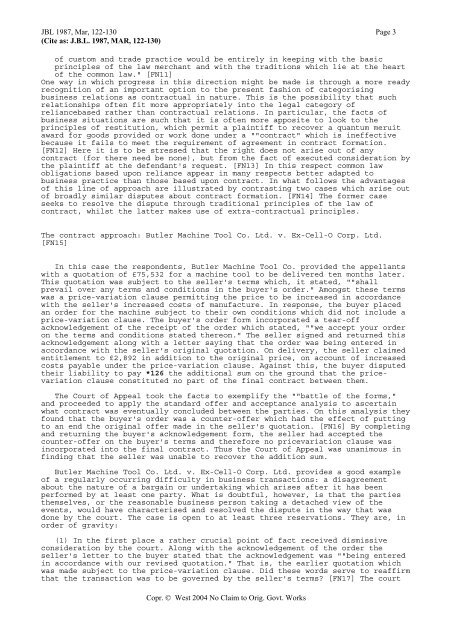Tesco v Constain - Thomson Reuters
Tesco v Constain - Thomson Reuters
Tesco v Constain - Thomson Reuters
You also want an ePaper? Increase the reach of your titles
YUMPU automatically turns print PDFs into web optimized ePapers that Google loves.
JBL 1987, Mar, 122-130 Page 3(Cite as: J.B.L. 1987, MAR, 122-130)of custom and trade practice would be entirely in keeping with the basicprinciples of the law merchant and with the traditions which lie at the heartof the common law." [FN11]One way in which progress in this direction might be made is through a more readyrecognition of an important option to the present fashion of categorisingbusiness relations as contractual in nature. This is the possibility that suchrelationships often fit more appropriately into the legal category ofreliancebased rather than contractual relations. In particular, the facts ofbusiness situations are such that it is often more apposite to look to theprinciples of restitution, which permit a plaintiff to recover a quantum meruitaward for goods provided or work done under a ""contract" which is ineffectivebecause it fails to meet the requirement of agreement in contract formation.[FN12] Here it is to be stressed that the right does not arise out of anycontract (for there need be none), but from the fact of executed consideration bythe plaintiff at the defendant's request. [FN13] In this respect common lawobligations based upon reliance appear in many respects better adapted tobusiness practice than those based upon contract. In what follows the advantagesof this line of approach are illustrated by contrasting two cases which arise outof broadly similar disputes about contract formation. [FN14] The former caseseeks to resolve the dispute through traditional principles of the law ofcontract, whilst the latter makes use of extra-contractual principles.The contract approach: Butler Machine Tool Co. Ltd. v. Ex-Cell-O Corp. Ltd.[FN15]In this case the respondents, Butler Machine Tool Co. provided the appellantswith a quotation of £75,532 for a machine tool to be delivered ten months later.This quotation was subject to the seller's terms which, it stated, ""shallprevail over any terms and conditions in the buyer's order." Amongst these termswas a price-variation clause permitting the price to be increased in accordancewith the seller's increased costs of manufacture. In response, the buyer placedan order for the machine subject to their own conditions which did not include aprice-variation clause. The buyer's order form incorporated a tear-offacknowledgement of the receipt of the order which stated, ""we accept your orderon the terms and conditions stated thereon." The seller signed and returned thisacknowledgement along with a letter saying that the order was being entered inaccordance with the seller's original quotation. On delivery, the seller claimedentitlement to £2,892 in addition to the original price, on account of increasedcosts payable under the price-variation clause. Against this, the buyer disputedtheir liability to pay *126 the additional sum on the ground that the pricevariationclause constituted no part of the final contract between them.The Court of Appeal took the facts to exemplify the ""battle of the forms,"and proceeded to apply the standard offer and acceptance analysis to ascertainwhat contract was eventually concluded between the parties. On this analysis theyfound that the buyer's order was a counter-offer which had the effect of puttingto an end the original offer made in the seller's quotation. [FN16] By completingand returning the buyer's acknowledgement form, the seller had accepted thecounter-offer on the buyer's terms and therefore no pricevariation clause wasincorporated into the final contract. Thus the Court of Appeal was unanimous infinding that the seller was unable to recover the addition sum.Butler Machine Tool Co. Ltd. v. Ex-Cell-O Corp. Ltd. provides a good exampleof a regularly occurring difficulty in business transactions: a disagreementabout the nature of a bargain or undertaking which arises after it has beenperformed by at least one party. What is doubtful, however, is that the partiesthemselves, or the reasonable business person taking a detached view of theevents, would have characterised and resolved the dispute in the way that wasdone by the court. The case is open to at least three reservations. They are, inorder of gravity:(1) In the first place a rather crucial point of fact received dismissiveconsideration by the court. Along with the acknowledgement of the order theseller's letter to the buyer stated that the acknowledgement was ""being enteredin accordance with our revised quotation." That is, the earlier quotation whichwas made subject to the price-variation clause. Did these words serve to reaffirmthat the transaction was to be governed by the seller's terms? [FN17] The courtCopr. © West 2004 No Claim to Orig. Govt. Works
















